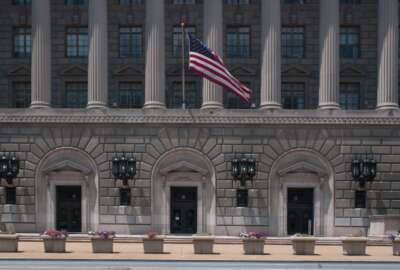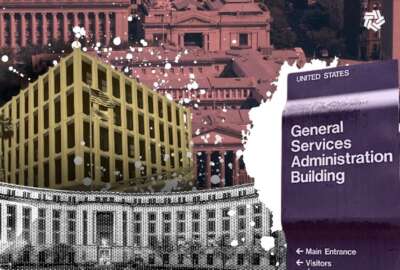GSA official who reshaped federal office space in pandemic era leaving government
A top Biden administration official who helped rethink federal buildings and office space for government employees, after pandemic-era work-from-home policies...
A top Biden administration official who helped rethink federal buildings and office space for government employees, after pandemic-era work-from-home policies lapsed, is stepping down later this week.
Nina Albert, the commissioner of the General Services Administration’s Public Buildings Service, is leaving the agency and federal service on Friday.
Albert led PBS as the Biden administration faced bipartisan calls from Congress to make better use of federal office space, and get rid of buildings that agencies no longer need.

The federal workforce’s office space needs, however, keep shifting.
Federal buildings emptied out at the height of the COVID-19 pandemic, and many employees since have settled into a rhythm of working from home for at least part of the work week.
However, many federal employees are preparing to head back to the office more regularly this fall, or in the coming months, after the Office of Management and Budget directed agencies to increase “meaningful” in-office work.
“The opportunity to define hybrid work and demonstrate how GSA can improve the workplace experience for millions of federal workers, as well as right-size the federal footprint, has been my goal,” Albert said in a statement Tuesday. “I know that the PBS team will continue to steward these efforts in support of federal agencies’ missions and to the benefit of communities across the United States.”
GSA Administrator Robin Carnahan, in an email to employees on Tuesday, said Albert has also been “helping to define how we modernize and optimize the federal footprint.”
“Everyday our PBS colleagues deliver tremendous value and impact for the millions of people we serve — and I know they will continue to lead the way on optimizing, modernizing, and reshaping the federal footprint to make it sustainable and resilient for years to come,” Carnahan wrote.
Elliot Doomes, GSA’s regional administrator for the National Capital Region, has been appointed to serve as the next PBS commissioner. Prior to joining GSA, Doomes served more than 20 years on Capitol Hill, including as a staff member for the Financial Services and General Government Subcommittee of the House Appropriations Committee.
Through its Workplace Innovation Lab, which opened in January 2023, GSA lets agency leaders and their employees test new furniture and technology meant to support hybrid work.
GSA has also begun letting government employees test out federal co-working spaces across the country. The agency has established co-working spaces in Chicago, Denver, Kansas City, Philadelphia, San Francisco and Tacoma, Washington.
“Right now, what I believe agencies can expect in this coming year, as well as our taxpayers, is more definitive planning on what is happening at the local level, at the regional level and at the national level across the real estate portfolio,” Albert said at Federal News Network’s Workplace Reimagined event.
Albert appeared before several congressional committees this year, as lawmakers pressed GSA for details on how much office space the federal workforce needs, and questioned why GSA wasn’t selling underutilized office space more quickly.
Lawmakers’ probes intensified after the Government Accountability Office, in a recent report, found that all 24 of the agency headquarters offices it reviewed had excess space, and that 17 of them were at or below 25% of their full occupancy.
Albert told members of the House Transportation and Infrastructure Committee in March that some agencies are leading office space consolidation efforts, “because they are more confident in what their plans are.”
More broadly, however, Albert told lawmakers that much of the federal government is still uncertain about how much office space the federal workforce will need in the long term.
“We’re trying to understand how the pendulum will swing and what ultimate utilization is for the next decade,” Albert said. “Utilization shifts over time, as workforce and workplace trends shift over time.
Albert told the Senate Environment and Public Works Committee last month that “right-sizing the federal footprint can be accelerated,” if GSA gains full access to the Federal Buildings Fund, where it deposits rent payments collected from agencies using GSA-owned properties.
“The opportunity before us is to transform the federal real estate portfolio into a high-performing and more efficient portfolio than today’s inventory. I like to say that we want better buildings, but fewer buildings,” Albert said.
Congress since 2011 has diverted about $1 billion each year from the Federal Buildings Fund to cover other agencies’ budgets. Albert said Congress siphoning off these funds has delayed investments in federal buildings, and limited opportunities for agencies to consolidate office space.
“We have seen minor issues grow into more costly repairs and replacements. It’s also delaying consolidation plans, forcing the government to carry space that is underutilized,” Albert said.
That repair and maintenance backlog, she added, helps explain why agencies, over nearly a decade, have missed as many as 120 opportunities to consolidate federal office space, “representing hundreds of millions in annual savings that have been missed due to lack of available funding.”
Albert took office as PBS commissioner in July 2021, and oversaw more than 371 million square feet of government-owned and leased space across the country. In this role, she led GSA’s nationwide asset management, design, construction, leasing, building management and disposal activities.
During her tenure, Albert oversaw COVID-19 risk mitigation efforts across GSA’s federal building portfolio. She also oversaw nearly $7 billion in new investments under the Bipartisan Infrastructure Law and the Inflation Reduction Act.
GSA currently owns or leases more than 8,800 assets, maintains the workspace for 1.1 million federal employees, and preserves more than 500 historic properties.
Copyright © 2025 Federal News Network. All rights reserved. This website is not intended for users located within the European Economic Area.
Jory Heckman is a reporter at Federal News Network covering U.S. Postal Service, IRS, big data and technology issues.
Follow @jheckmanWFED





